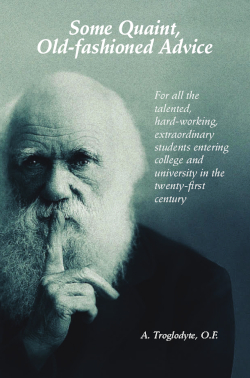|
|
|

Student Publications
 Back Back
 | Some Quaint, Old-fashioned Advice
For all the talented, hard-working, extraordinary students entering college and university in the twenty-first century
A. Troglodyte, O. F.
“In spite of all that can be said against our age, what a moment it is to be at university!”
Some Quaint, Old-fashioned Advice has been written to help students get the most from their time at university. It has also been written to give potential students a glimpse into university life – its rewards, its challenges, its character.
Numerous survival guides populate the shelves of university bookstores. Even so, few discuss what is most distinctive about university life. Some discuss how to prepare for admissions exams. Others focus on how to make (and stick to) a budget, how to cook one’s own meals or how to find the best deals on everything from student accommodations to smart phones. These are all valuable skills, but they do little to help students understand what’s special about universities and how to get the most from their time at university. They also do little to explain why a university education is important.
This book is different. Rather than giving suggestions about how best to navigate one’s newfound social independence, this book focuses on helping students (both young and old) take advantage of their newfound intellectual independence. It says something about the opportunities and excitement a university education offers, and about the difference between a successful and an unsuccessful degree. It also includes some concrete suggestions about how to make the most of one’s time at university.
To anyone who recently has been accepted into college or university, congratulations! Your adventure is about to begin!
A. Troglodyte began writing at Oxford University over a century ago. Recently, he (Or she? Or they? – no one really knows) has re-emerged to give advice to today’s talented, hard-working college and university students.
4 May 2022
978-1-84890-396-8
Buy from Amazon: UK US
Review:
"Some Quaint, Old-fashioned Advice is a loving gift from one academic generation to the next." Regan Ross
https://safs.ca/newsletters/article.php?article=1212
"I wish I had been given this book in my final year of high school. ... [This is a book that] should be required reading for every new undergraduate irrespective of their chosen discipline. ... Some Quaint, Old-fashioned Advice is a loving gift from one academic generation to the next."
Regan Ross (SAFS, https://safs.ca/newsletters/article.php?article=1212)
“This book has two main goals. The first is to help undergraduates make the most of their educational opportunities and their intellectual independence. The second is to articulate the nature and value of a good university education. … The book has been motivated – at least in part – by today’s culture wars. Both the book’s title and the author’s nom de plume give a humorous nod to the question of whether the old-fashioned idea of a university as a place of disinterested scholarship and learning still applies to universities. Unlike anything else I’ve read, the book invites instructors and students to discuss their intellectual goals and ambitions in a context that is both entertainingly contemporary and historically informed.”
Jim Robinson (Teaching Philosophy, https://www.pdcnet.org/teachphil/content/teachphil_2023_0046_0002_0274_0278)
|
|
|

